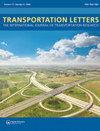探究时间压力对电动两轮车骑行者超速行为的影响
IF 3.3
3区 工程技术
Q2 TRANSPORTATION
Transportation Letters-The International Journal of Transportation Research
Pub Date : 2025-04-21
DOI:10.1080/19427867.2024.2368348
引用次数: 0
摘要
尽管机动两轮车(MTW)价格低廉,而且是最方便的出行方式,但与其他出行方式相比,机动两轮车更容易发生碰撞事故。超速是造成此类交通事故的主要原因之一。本文章由计算机程序翻译,如有差异,请以英文原文为准。
Exploring the impact of time pressure on motorized two-wheeler riders’ over-speeding behavior
Despite being inexpensive and the most accessible travel mode, motorized two-wheelers (MTW) are more prone to crashes than other travel modes. Over-speeding is one of the principal causes of such MTW-related crashes. Past studies are nonexistent in exploring the impact of time pressure and psychological constructs on MTW riders’ over-speeding behavior. Therefore, this paper captures the impact of the time pressure situations and identifies psychological segments (based on travel time-related anxiety) on the over-speeding behavior among MTW riders. A two-step modeling approach, including latent class analysis and multinomial logit model (MNL), was utilized for a stated preference survey of 513 Indian MTW riders. The latent class analysis identified three different psychological segments, i.e. minimally anxious, moderately anxious, and highly anxious. Results showed that over-speeding behavior is more likely to increase with travel time-related anxiety levels and hurriedness. The findings are expected to offer potential policy implications for mitigating speeding-related violations.
求助全文
通过发布文献求助,成功后即可免费获取论文全文。
去求助
来源期刊

Transportation Letters-The International Journal of Transportation Research
TRANSPORTATION SCIENCE & TECHNOLOGY-
CiteScore
6.40
自引率
14.30%
发文量
79
审稿时长
>12 weeks
期刊介绍:
Transportation Letters: The International Journal of Transportation Research is a quarterly journal that publishes high-quality peer-reviewed and mini-review papers as well as technical notes and book reviews on the state-of-the-art in transportation research.
The focus of Transportation Letters is on analytical and empirical findings, methodological papers, and theoretical and conceptual insights across all areas of research. Review resource papers that merge descriptions of the state-of-the-art with innovative and new methodological, theoretical, and conceptual insights spanning all areas of transportation research are invited and of particular interest.
 求助内容:
求助内容: 应助结果提醒方式:
应助结果提醒方式:


